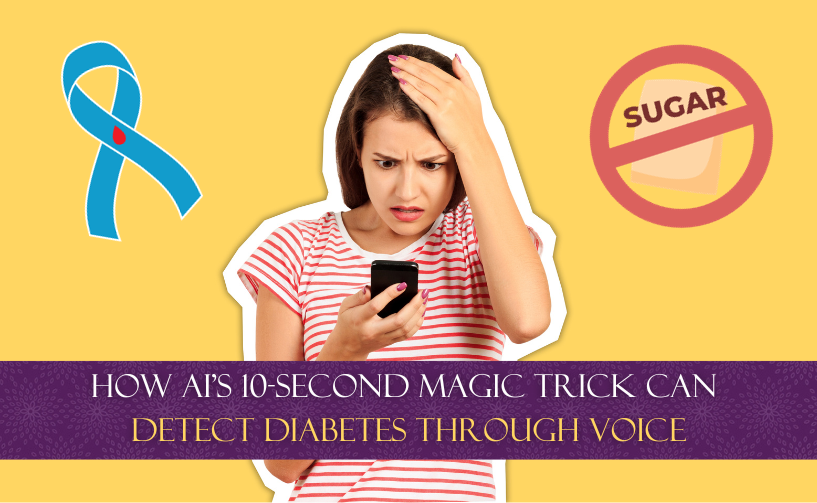In the rapidly evolving landscape of healthcare technology, one innovation stands out – the marriage of artificial intelligence and voice analysis. This revolutionary diagnostic tool not only promises to detect diabetes but also offers a swift, non-invasive alternative to traditional screening methods. In this exploration, we will delve into the intricacies of this cutting-edge technology, unravelling the potential it holds and addressing the ethical considerations that accompany such advancements.
The Silent Epidemic: Undetected Diabetes
Around the globe, an estimated 240 million adults live with undiagnosed diabetes, with nearly 90% of cases being type 2 diabetes. This silent epidemic poses a significant risk, as those with diabetes face elevated chances of cardiovascular diseases. Traditional screening methods often involve time-consuming and costly trips to healthcare providers. Enter voice analysis – a potential game-changer in diabetes detection.
The Mechanics of Voice Analysis
Voice frequency analysis, a sophisticated offspring of AI, delves into changes in the voice that are imperceptible to the human ear. With a mere 10-second voice sample, this technology analyses factors such as speech melody, cadence, pauses, and pitch. The human voice, with its vast array of 200,000 distinct characteristics, becomes a rich tapestry for AI algorithms to unravel.
Unveiling Remarkable Accuracy
In a study recent study by Mayo Clinic Proceedings, researchers demonstrated the remarkable accuracy of AI in detecting type 2 diabetes. The AI examined voice recordings lasting 6 to 10 seconds, achieving an 89% accuracy rate for females and 86% for males. When coupled with basic health data, this AI-driven tool becomes a formidable force in early diabetes detection.

The Human Touch: Expertise Over Automation
While the allure of swift and efficient diagnosis through AI is undeniable, it's crucial not to overshadow the importance of human expertise. A handful of voice samples can provide indications, but they cannot replace the thorough evaluation of a trained medical professional. This is particularly pertinent when dealing with psychological illnesses, where the nuances of human understanding are irreplaceable.
Building the Symphony: The Research Journey
To train the AI, researchers recorded the voices of 267 individuals over two weeks, generating a staggering 18,000 voice samples. Through meticulous analysis, they identified 14 acoustic features that differentiate between individuals with and without type 2 diabetes. The process underscores the potential for voice analysis to be a powerful tool in healthcare.
The Dangers of Overdiagnosis
While the speed and efficiency of AI-supported diagnosis are praised, caution must be exercised. Critics raise valid concerns about the risk of false positives and overdiagnosis. As we embrace the future of healthcare technology, it's imperative to strike a balance between the promises of AI and the need for accuracy in medical assessments.

Beyond Diabetes: Future Frontiers
Looking ahead, the possibilities are tantalising. Klick Labs, the organisation behind this pioneering research, aims to explore whether voice analysis can extend its capabilities to detect conditions like prediabetes or hypertension. The potential applications of this technology in preventative healthcare are vast.
The Ethical Quandary: Misuse and Privacy Concerns
As with any powerful tool, the misuse of voice analysis raises ethical concerns. Critics and data protectionists warn of potential exploitation by employers or insurance companies, jeopardising personal health information. Clear regulations and limits on the use of voice analysis in diagnostics become imperative, falling within the purview of ethical and political considerations.
The Promises and Perils of a Voice-Driven Future
In conclusion, the fusion of AI and voice analysis holds immense promise in the realm of healthcare diagnostics. The ability to detect diabetes with a 10-second voice sample is undeniably impressive, but it comes with its set of challenges. As we navigate this uncharted territory, let's approach these innovations with cautious optimism, ensuring that the melody of our voices remains a source of empowerment, not vulnerability.
The future of healthcare might be in the symphony of voices, but let it be a harmonious one, guided by ethical considerations and a commitment to the well-being of all. The promises and perils of a voice-driven future remind us that, in the pursuit of technological advancement, we must remain steadfast in safeguarding the sanctity of our health information and the human touch that defines compassionate healthcare.





